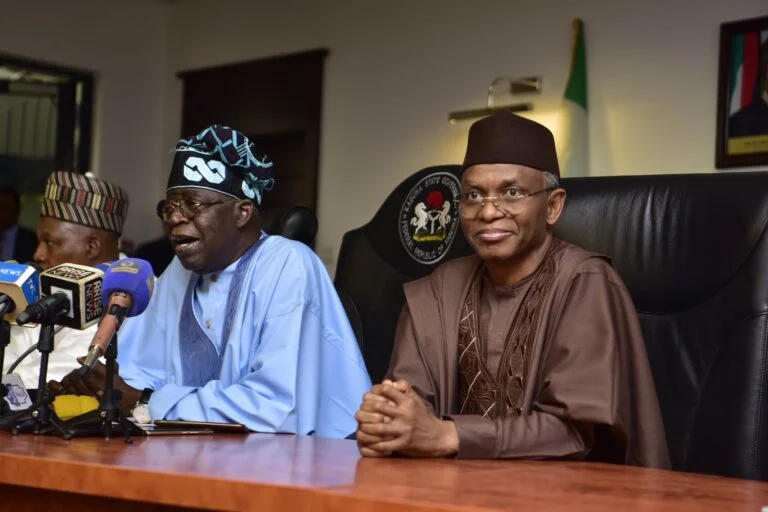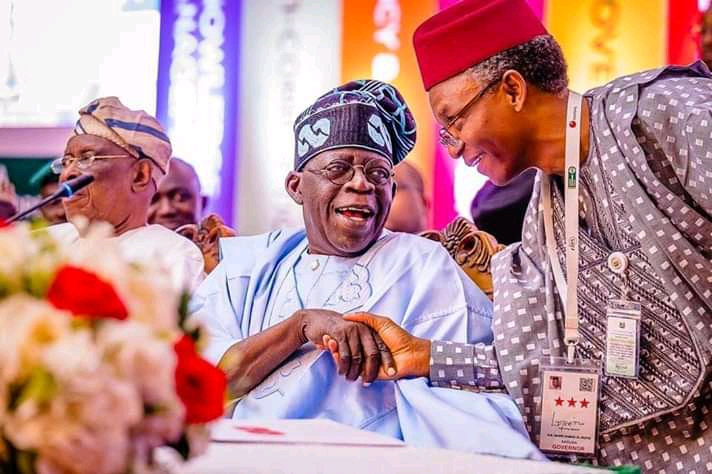It is trite to say that the once cosy ties between former Kaduna State Governor Nasir El-Rufai and President Bola Tinubu have now gone sour.
The two former political allies are now in the trenches, with the ex-governor faulting the Tinubu-led administration while the presidency fires back, accusing El-Rufai of witch-hunting and betrayal.
In this report, The New Daily Prime examines the undercurrents behind the lingering frosty relationship between the duo
It is a verified truism that, as the saying goes, ‘in Politics, there are no permanent friends or enemies, but permanent interests.’
However, the ambition of once-close allies—whether within the same political party or not—often transforms them into rivals in their quest to be elected into public offices.
While these political rivalries may eventually subside, oftentimes, they leave lasting impacts on the political space.
READ ALSO: El-Rufai defends criticism of Tinubu administration
This political dynamic has been evident in Nigeria’s political landscape, particularly in the relationship between former Vice President Atiku Abubakar and Nyesom Wike, the Minister of the Federal Capital Territory (FCT).
Wike, a two-term governor of Rivers State under the Peoples Democratic Party (PDP), had a cordial relationship with Atiku, frequently inviting him for project inaugurations and political engagements.
However, their political camaraderie ended when Wike worked against Atiku’s presidential bid in support of President Tinubu.

In return for his efforts, Wike was appointed as a minister in the Tinubu-led administration, fueling further political animosity between Atiku and Wike.
Tinubu vs El-Rufai: A growing rift
Now, a similar political feud is unfolding between President Tinubu and former Kaduna State Governor, Nasir El-Rufai.
El-Rufai and Tinubu were once close allies, with Tinubu visiting and commissioning projects in Kaduna State during El-Rufai’s tenure as governor.
Tinubu even praised El-Rufai’s leadership acumen, describing him as a visionary and creative thinker whose qualities were necessary for Nigeria’s transformation.
During the build-up to the 2023 presidential election, El-Rufai played a crucial role in mobilizing support for the Tinubu presidential race.
READ ALSO: El-Rufai slams Reno Omokri over ministerial appointment comments
In November 2022, he inaugurated the Kaduna State All Progressives Congress (APC) Campaign Council and pledged total support for Tinubu’s presidential bid, declaring that a vote for APC was a vote for progress and development.
However, cracks in their relationship began to appear when the Tinubu Support Organisation initially endorsed El-Rufai as a potential vice-presidential candidate, only for Tinubu to go for Kashim Shettima, the former Borno State governor.
Further tensions escalated when El-Rufai, despite downplaying speculations that he was lobbying for the position of Chief of Staff, was later nominated as a minister but failed to secure the Senate’s confirmation due to alleged security concerns.
El-Rufai’s inability to become a minister was a major turning point in his cosy relationship with Tinubu. Reports suggested that he had initially planned to leave the country after his tenure as governor, but reconsidered after Tinubu promised to appoint him Minister of Power and Gas.

However, following a series of security-related allegations, the Senate withheld his confirmation, leaving many political observers stunned that an ally as influential as El-Rufai was among the rejected ministerial nominees.
Despite being a key figure in Tinubu’s campaign, El-Rufai’s exclusion from the cabinet was perceived as a political betrayal, reigniting tensions between the two political soulmates.
While he assured Tinubu that he no longer sought a ministerial position, instead opting to focus on his doctorate programme in the Netherlands, his actions have continued to spark speculations. He even recommended Jafaru Ibrahim Sani as a ministerial replacement for Kaduna State.
Nevertheless, their once-mended ties appear to have gone awry again, with El-Rufai voicing critical statements against the Tinubu-led administration.
READ ALSO: Economic Reforms or Public Confusion? The True State of Nigeria’s Fuel Subsidy Under Tinubu
Many believe this renewed hostility stems from his rumoured 2027 presidential ambition.
Is El-Rufai eyeing the 2027 presidency?
Although El-Rufai has not officially declared his own intention to run in 2027, his growing rift with Tinubu and recent engagements with the opposition Social Democratic Party (SDP) have continued to fuel speculations.
His criticisms of Tinubu and the APC, despite being a staunch supporter of the president and the party in the 2023 polls, suggest a potential shift in political allegiance.
Speculations also heightened after he and Atiku’s allies held a private meeting with SDP leaders at the party’s national secretariat in Abuja.

The closed-door meeting, attended by figures like Maj. Hamza Al-Mustapha, a former presidential candidate and ex-chief Security Officer to Gen. Sani Abacha, and Atiku’s former spokesman, Otunba Segun Showunmi, has been described as part of a broader strategy to build a formidable opposition ahead of the 2027 elections.
While El-Rufai has not formally announced a presidential bid, his recent political manoeuvres indicate he may be positioning himself as a challenger to Tinubu.
His snide remarks about Tinubu’s administration, coupled with speculations that he was sidelined from a ministerial appointment due to internal power struggles, suggest he may be feeling politically alienated.
READ ALSO: Atiku, El-Rufai disgruntled people licking their wounds – APC
If he and other disenchanted politicians believe they have the numbers, they could mount a serious challenge in 2027.
For now, El-Rufai remains a political enigma—one whose next move will determine whether he remains an influential behind-the-scenes strategist or emerges as a direct contender for Nigeria’s highest office.


